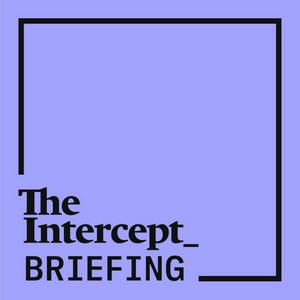386 episodios
- Cuba is spiraling into a humanitarian crisis. The country’s long-standing economic and political turmoil reached new heights this week as the effects of the Trump administration’s oil blockade took hold.
The president’s targeting of Cuba is part of the administration’s broader attacks on the region, where the U.S. kidnapped Venezuelan President Nicolás Maduro and his wife Cilia Flores earlier this year and has executed more than 140 people in boat strikes.
As the U.S. hurtles toward war with Iran and further military action in the Middle East and continues to fund Israel’s genocide in Gaza, Cuba is just the latest foreign policy arena where the Trump administration has further ensnared the U.S. This week on The Intercept Briefing, senior politics reporter Akela Lacy speaks with fellow reporter Jonah Valdez about how U.S. foreign policy is impacting the upcoming midterm elections and Valdez’s recent reporting on how a new anti-Zionist PAC has associated with influencers that have made statements that are outright antisemitic.
Lacy also speaks to University of Miami history professor Michael Bustamante and Andrés Pertierra, a historian of Cuba specializing in post-1959 regime durability, about the crisis unfolding in Cuba.
Missing from mainstream news coverage of Trump’s attacks on Cuba and U.S. efforts to impose regime change in the region is a recognition of how Trump’s policies fit into his attacks on immigrants in the U.S., Bustamante says.
“One of the, I think, subtext of why this administration might be keen on government change in Cuba, like in Venezuela, it's not just about being able to plant the flag and say, ‘We buried communism in the Americas. Something that no other president could do,’” Bustamante says.
“It's also about, we can deport more people. And we can deport more people. And so how does the Cuban American community react to that? That, I think, is an open question. Something that I haven't seen linked yet to the conversation about regime change, per se.”
The Trump administration’s strategy is likely to backfire, Pertierra says.
“You don't get long-term cooperation stability through fear,” he says. “So I don't think it's actually going to solidify the U.S. position in Latin America. I think it's going to further weaken it.”
Listen to the full conversation of The Intercept Briefing on Apple Podcasts, Spotify, or wherever you listen.
Keep our investigations free and fearless at theintercept.com/join.
Hosted on Acast. See acast.com/privacy for more information. - Cut through the noise with The Intercept’s reporters as they tackle the most urgent issues of the moment. The Briefing is a weekly podcast delivering incisive political analysis and deep investigative reporting, hosted by The Intercept’s journalists and contributors including Jessica Washington, Akela Lacy, and Jordan Uhl. Hosted on Acast. See acast.com/privacy for more information.
- Attorney General Pam Bondi testified before the House Oversight Committee on Wednesday, defending the Justice Department’s widely criticized rollout of the Epstein files against accusations that her department is shielding powerful men, including President Donald Trump, at the expense of survivors.
Democrats, who reviewed the unredacted files for the first time this week, revealed that the names of “wealthy, powerful men” were improperly redacted, while the names of victims were left exposed.
This week on The Intercept Briefing, co-hosts Jessica Washington and Akela Lacy gave their rundown of the politics stories they’re watching right now. Washington also spoke with Spencer Kuvin, an attorney representing nine of Epstein’s victims, about the failures of the Department of Justice to protect survivors.
“From the beginning of this case, the government, both from a state and federal level, have been trying to bury this, cover it up, and avoid any full exposure of the extent of the operation that was involved here,” Kuvin said, “and they're doing it … because of all the both political, wealthy, and powerful individuals who were involved with Epstein and knew what was going on with these young women.”
Kuvin also spoke about the DOJ’s failure to redact the names of victims in the files, including two of his clients who were victimized as children. “The current Department of Justice has a focus on something different than victims and helping victims and prosecuting bad people that victimize these young girls,” he said. “Their focus instead appears to be on the important people — powerful people that are contained within these files and protecting them instead of protecting who needs the protection, the young victims in this case.”
Listen to the full conversation of The Intercept Briefing on Apple Podcasts, Spotify, or wherever you listen.
Hosted on Acast. See acast.com/privacy for more information. - The word “terrorist” wasn’t coined on September 11, 2001, but the defining event of the early 21st century ushered it in as the United States’ go-to term for demonizing outsiders and dissenters alike. The so-called “war on terror” transformed the way the U.S. wields power at home and abroad, enabling mass surveillance and a crackdown on the right to free speech. It became reflexive for the U.S. to disparage immigrants and protesters as supporters of terrorism.
President Donald Trump has embraced this model and manipulated it for his own ends, as author Spencer Ackerman points out. The Trump administration often peddles spurious accusations of terrorism against the targets of its immigration raids.
“There's nothing about any of their action that's remotely anything at all like terrorism,” Ackerman says. “But that is the fire in which ICE, CBP, and the Department of Homeland Security was forged. You are going to find this in its DNA.”
This week on the Intercept Briefing, host Jordan Uhl speaks with Ackerman, a leading expert on the concept of terrorism and its weaponization by the state. Ackerman’s 2021 book, “Reign of Terror, How the 9/11 Era Destabilized America and Produced Trump,” traces the legal and cultural evolution of the last 25 years, and how the boomerang has come back home.
“Before 9/11, not only was there no ICE, there wasn't really much in the way of a robust internal mechanism for finding and deporting people who were in the country illegally. When it did exist, it was for people who were serious criminals, traffickers, and so on,” says Ackerman. Now, he says, the contemporary terrorism paradigm has transformed immigration enforcement into something “operating like a death squad.”
“What we are seeing on the streets of Minneapolis is what ICE has done to the undocumented for a very long time,” he says. “And now we're seeing this happen to white people on the streets of Minneapolis for little more than filming ICE.” With the recent killings of Renee Good and Alex Pretti, “I worry that a tremendous amount of our political system is geared toward either, on the Republican side, rationalizing it, justifying it, or on the Democratic side, pretending as if this is some kind of abuse that can be exceptionalized, rather than something that has to do with this 25-year history of coalescing immigration enforcement in the context of counterterrorism.”
As Democrats in Congress struggle to leverage DHS funding for changes to ICE policy — like a ban on face masks for ICE agents, an idea on which they’ve already softened — Ackerman says the parallels with the early 2000s are clear.
“We can't move in reformist directions when the thing talked about being reformed laughs at killing Americans,” advises Ackerman. “Reformist politics under two Democratic administrations got us to where we are now. These are accommodationist politics, and the thing being accommodated wants to kill you.”
Listen to the full conversation of The Intercept Briefing on Apple Podcasts, Spotify, or wherever you listen.
If you want to support our work, you can go to theintercept.com/join.
Hosted on Acast. See acast.com/privacy for more information. Even the Top Prosecutor in Minneapolis Doesn’t Know the Identity of the Agents Who Killed Alex Pretti
30/1/2026 | 52 minIn the two months Minnesota has been under siege by federal agents, immigration officers have shot and killed two U.S. citizens, poet and artist Renee Good and ICU nurse Alex Pretti. Local and state law enforcement say they’ve been blocked from properly investigating the shootings of Good and Pretti.
“The federal government has blocked our state BCA, so that's the Bureau of Criminal Apprehension. They are the state law enforcement agency that has authority to investigate any kind of deadly use of force involving police,” says Hennepin County Attorney Mary Moriarty, who is leading local investigations into the killings of Good and Pretti.
“We've not gotten anything from the federal government,” Moriarty says. “To tell you how odd this situation is, we are getting our information from the media ... we are not getting that from the federal government.”
This week on The Intercept Briefing, host Akela Lacy speaks with Moriarty, whose office has jurisdiction over both killings. Moriarty says federal agents have blocked local and state law enforcement from properly investigating the killings. Even Moriarty, the top prosecutor in Minneapolis, does not know the identity of the agents who killed Pretti.
In response, Moriarty says, “We set up a portal and asked the community to send any kind of videos or any other kind of evidence so that we could collect absolutely everything that we possibly could.” The BCA, she says, was even “blocked physically, actually, by federal agents from processing the scene where Alex Pretti was shot.”
Meanwhile, attacks by the administration on Minnesota’s Somali citizens persist. At her first town hall of the year in Minneapolis, an attendee sprayed Rep. Ilhan Omar with an unidentified substance on Tuesday. Trump has backtracked on some of his bluster and removed Border Patrol Gregory Bovino from Minnesota, replacing him with border czar Tom Homan.
None of that has changed things on the ground yet in Minneapolis, says Moriarty. “Minnesotans care about their neighbors. They're delivering meals to people. They are there and they do not approve of the fact that their federal government is attacking them and their neighbors.
“We hear a lot of people talking to us about how they understand the threat from the administration or from DHS on their neighbors and on their communities, and it's really much more rooted in an understanding that they think their freedoms are under threat, even if they are not an immigrant or even if they don't really have deep ties to immigrant communities, that this really matters to them and it really bothers them,” says Jill Garvey, co-director of States at the Core, an organization that leads and runs ICE Watch training programs. “So we hear a lot from folks who just haven't been engaged previously. But this for all those reasons is enough for them to step up.”
Garvey says her organization is training community members in how to properly document ICE. “We also know that we can't stop all this aggression,” Garvey says. “The aggression is the point of these operations. So we can't guarantee that people aren't going to be targeted with violent actions from federal law enforcement. What we can say is, if you're doing this in community, other people are going to be watching.”
Listen to the full conversation of The Intercept Briefing on Apple Podcasts, Spotify, or wherever you listen.
If you want to support our work, you can go to theintercept.com/join.
Hosted on Acast. See acast.com/privacy for more information.
Más podcasts de Noticias
Podcasts a la moda de Noticias
Acerca de The Intercept Briefing
Cut through the noise with The Intercept’s reporters as they tackle the most urgent issues of the moment. The Briefing is a new weekly podcast delivering incisive political analysis and deep investigative reporting, hosted by The Intercept’s journalists and contributors including Jessica Washington, Akela Lacy, and Jordan Uhl. Hosted on Acast. See acast.com/privacy for more information.
Sitio web del podcastEscucha The Intercept Briefing, Así las cosas con Carlos Loret de Mola y muchos más podcasts de todo el mundo con la aplicación de radio.net

Descarga la app gratuita: radio.net
- Añadir radios y podcasts a favoritos
- Transmisión por Wi-Fi y Bluetooth
- Carplay & Android Auto compatible
- Muchas otras funciones de la app
Descarga la app gratuita: radio.net
- Añadir radios y podcasts a favoritos
- Transmisión por Wi-Fi y Bluetooth
- Carplay & Android Auto compatible
- Muchas otras funciones de la app


The Intercept Briefing
Escanea el código,
Descarga la app,
Escucha.
Descarga la app,
Escucha.






































